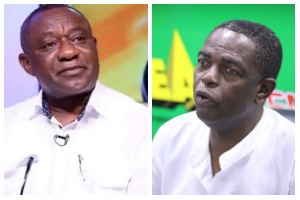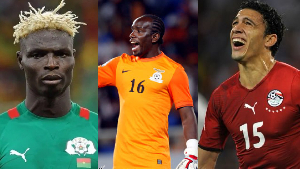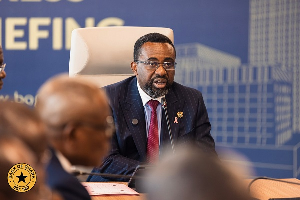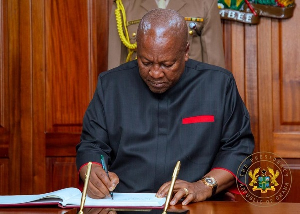By Kwame Okoampa-Ahoofe, Jr., Ph.D.
When the Minister for Employment and Social Welfare decries the procedure by which the New Crusading Guide’s investigative reporter exposed rank negligence and corruption at the Osu Children’s Home, as well as similar institutions, it becomes embarrassingly obvious that Mr. Enoch Teye Mensah knows next to nothing about the objective role and function of the media in modern Ghanaian society.
In the opinion of the National Democratic Congress’ Member of Parliament for Prampram, the New Crusading Guide’s investigative reporter, Mr. Anas Aremeyaw Anas, ought to have sought clearance from the government prior to going to the press with his exposé regarding the gross negligence and abject tyranny of those professionally entrusted with the care of the most vulnerable and needy in our society (See “Minister Blasts Anas!” Ghanaweb.com 9/4/10).
Maybe Mr. Mensah needs to be categorically told that the media’s primary and most sacred obligation is to the people, and not the bizarre and patently absurd glossing of the blighted image of President John Evans Atta-Mills and his ministerial cabinet.
It is also rather amusing how Mr. Mensah cavalierly presumes to instruct the media and/or its individual operatives on the best means of serving the people and our country. Such stance could not be more arrogant. Then again, the cynical operatives of the so-called National Democratic Congress, in its various disguises, are uniquely notorious for their brassy demeanor.
Still, what bears highlighting in the Anas exposé is the fact that it reveals absolutely nothing that Ghanaians both at home and abroad did not already know. Likewise, any foreign resident with a passably intimate knowledge about us and our culture over the past three-and-half decades that Mr. Rawlings and his P/NDC have dominated Ghana’s political theater could not have failed to quizzically recognize the fact that we are, generally speaking, morally and tragically an extrovertive/extroversive people who oddly seem to privilege the opinions of foreigners about us over and above our own opinions of ourselves!
And the foregoing, in fact, pathetically appears to be what the Minister of Employment and Social Welfare is alluding to when Mr. Mensah laments the great, perhaps even irreparable, damage that Mr. Anas Aremeyaw Anas’ exposé may have wreaked on our country. In the larger scheme of affairs, there is absolutely nothing unique about Ghana as a Third-World country in democratic political transition that is woefully bedeviled by rank executive as well as generalized corruption, our vehement public relations protestations to the contrary notwithstanding.
In other words, not even our quite laudable profile in the vanguard of the anti-colonial liberation struggle and piquant image as a fledgling model African democracy in the twenty-first century put us very far ahead of the proverbial rat-pack, as Mr. Gabby Asare Otchere-Darko, of the Danquah Institute (DI), recently had occasion to highlight vis-à-vis the state of virtual anomie into which Ghana was almost plunged in the wake of the Election 2008 impasse (See “Gabby: Ghana’s 2008 Election Was Flawed” DI Website 8/21/10).
What the New Crusading Guide exposé successfully did, however, was set a healthy precedent in Ghanaian journalism and media practice, in general, by generating incontrovertible evidence, however ideologically tendentious such evidence may even be aptly deemed, to forensically back up widespread allegations. I was also quite impressed by the investigative team’s intention of conducting similar exercises in such neighboring countries as Liberia and Senegal, and even right here in the United States of America, as a means of warranting the drawing of objective conclusions vis-à-vis our seemingly peculiar Ghanaian situation.
On the latter score, not very long ago, I even read that Mr. Anas was in the process of conducting a similar exercise in South Africa. On the question of postwar Liberia, though, while undoubtedly worthwhile, nonetheless, I wouldn’t personally put much premium on it. For, needless to say, Liberia is quite unique and an atypical situation. Washington, DC, on the other hand, could well serve as a template or model for the optimal operation of children’s homes, or orphanages, in Ghana. As well, the Anas Aremeyaw Anas team could investigate the conduct and administration of facilities for juvenile delinquents. This, however, is not to imply that everything here in the United States is hunky-dory; nothing could be farther from the truth.
In sum, like Ghana, the United States is ineluctably a society created, lived and operated by humans; and God awfully knows that a human society is one that is fundamentally flawed. The significant difference, of course, inheres in the fact that the United States, as an advanced and settled democracy, has far more comprehensive and efficient rules mediating the professional conduct of personnel entrusted with the ministration of charitable, or non-profit, public institutions.
Anyway, the narrative subplot that seems to have been conveniently neglected in the telling is the fact that the Kufuor-led New Patriotic Party (2000-08) appears to have created a far more conducive environment for the flourishing of institutions geared towards the care of the most vulnerable in Ghanaian society. We learn, for instance, that of the 127 orphanages across the country, a whopping 95, or 75-percent, were established around 2002, when President John Agyekum-Kufuor was in the middle of his first term in office.
Warts and all, what the foregoing clearly shows is that the New Patriotic Party is far more humanitarian-oriented than the “Cash-and-Carry” pseudo-revolutionary National Democratic Congress. During the previous twenty years that the P/NDC wielded both de facto and de jure power, only 32 orphanages existed in the country; and of the latter, only 5, or 16-percent, operated under central government supervision! No wonder, then, that the system has become so susceptible to rank abuse and administrative venality.
Significantly, while the Minister for Employment and Social Welfare may not be personally responsible for a patently ramshackle state of affairs going back almost to the very foundation of modern Ghana, nevertheless, Mr. Mensah’s brazen attempt to stage-manage the insufferable rot that is our social welfare system necessitates his immediate replacement by a more socially conscious minister, preferably one with expertise in sociology and/or social work.
We also, predictably, learn that acute funding dearth may be the bane of our social welfare department. But we also find it imperative to highlight the need for the government to implement a national cultural revival program. For increasingly, what we are witnessing is a deleterious breakdown of the traditional extended family system without any viable modern institutional substitute. For, even as a Ghanaweb.com forum discussant poignantly observed, almost every one of these orphans and runaways has a known family and/or relatives.
*Kwame Okoampa-Ahoofe, Jr., Ph.D., is Associate Professor of English, Journalism and Creative Writing at Nassau Community College of the State University of New York, Garden City. He is a Governing Board Member of the Accra-based Danquah Institute (DI) and author of 21 books, including “Ghanaian Politics Today” (Atumpan Publications/Lulu.com, 2008). E-mail: okoampaahoofe@optimum.net.
###
Opinions of Wednesday, 8 September 2010
Columnist: Okoampa-Ahoofe, Kwame
E. T. Mensah Does Not Have a Clue!!!
Africa













